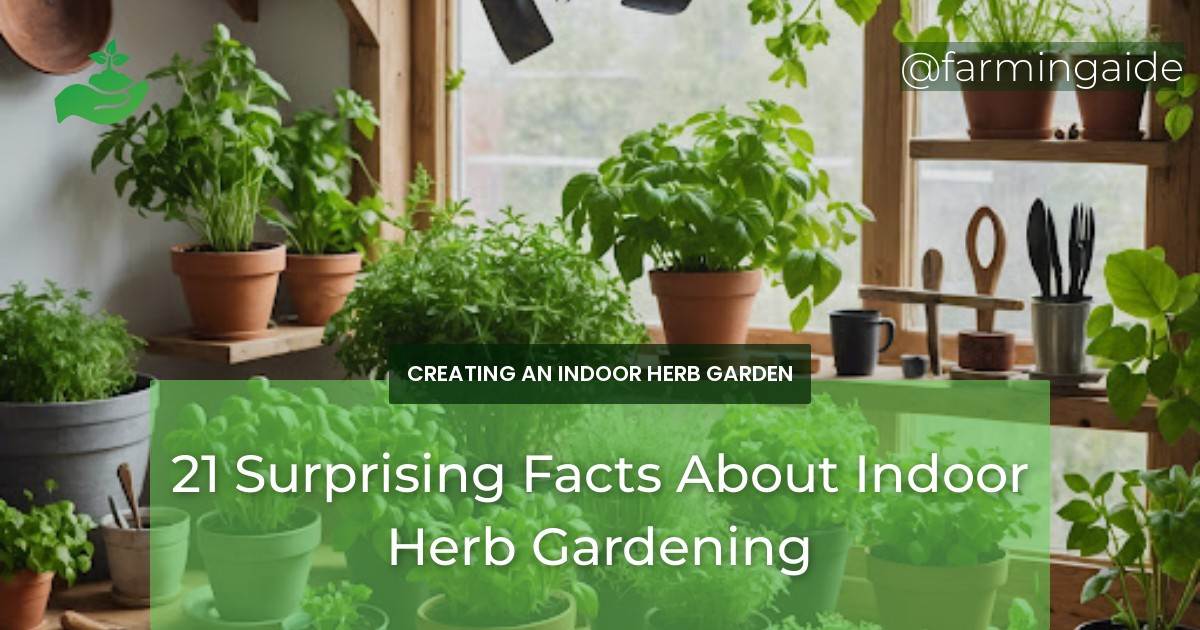Are you ready to unleash the power of indoor herb gardening? From surprising growth habits to optimal light conditions, unique watering needs, and essential nutrients, there’s more to growing herbs indoors than meets the eye. In this comprehensive guide, we’ll dive into 21 surprising facts about indoor herb gardening that will take your herb game to the next level.
Key Takeaways
- Indoor herb gardening offers numerous benefits, including fresh flavors, air purification, and stress relief.
- Optimal light conditions vary by herb, with some requiring direct sunlight and others thriving in low-light conditions.
- Herbs have unique watering needs, and overwatering is a common mistake that can lead to root rot.
- Essential nutrients like nitrogen, phosphorus, and potassium are crucial for healthy herb growth.
- Natural pest control methods, such as neem oil and diatomaceous earth, can effectively manage pests without harming the environment.
Introduction to Indoor Herb Gardening
Indoor herb gardening is a rewarding hobby that offers numerous benefits, from fresh flavors to air purification and stress relief. Whether you’re a seasoned gardener or a beginner, growing herbs indoors can be a fun and rewarding experience. But, did you know that indoor herb gardening involves more than just planting seeds and watering? From surprising growth habits to optimal light conditions, unique watering needs, and essential nutrients, there’s a lot to learn about growing herbs indoors.
In this article, we’ll delve into the world of indoor herb gardening, exploring 21 surprising facts that will take your herb game to the next level. From the benefits of indoor herb gardening to pest management and harvesting, we’ve got you covered.
Benefits of Indoor Herb Gardening
Indoor herb gardening offers numerous benefits, from fresh flavors to air purification and stress relief. Not only do herbs add flavor and aroma to a variety of dishes, but they also purify the air, reducing stress and promoting well-being. Indoor herb gardens can also provide a sense of accomplishment and connection to nature, even in the midst of urban living.
But that’s not all. Indoor herb gardening can also help reduce food waste, provide a sustainable source of fresh herbs, and offer a fun and rewarding hobby for gardeners of all levels.
Common Herbs for Indoor Gardening
Basil, mint, cilantro, parsley, and rosemary are just a few of the many herbs that thrive in indoor gardens. These herbs are perfect for beginners, as they’re easy to grow and require minimal maintenance. But, did you know that some herbs have surprising growth habits that can affect their growth and flavor?
For example, basil loves warmth and light, but it can be sensitive to temperature fluctuations. Mint, on the other hand, is a hardy herb that can grow in a variety of conditions, but it can be invasive and require regular pruning.
Surprising Facts About Herb Growth
ALSO READ
Unusual Growth Habits of Common Herbs
Herbs have unique growth habits that can affect their growth and flavor. For example, did you know that:
| Herb | Growth Habit |
|---|---|
| Basil | Loves warmth and light, but sensitive to temperature fluctuations |
| Mint | Hardy and adaptable, but can be invasive and require regular pruning |
| Cilantro | Fast-growing, but can bolt quickly if not harvested regularly |
| Parsley | Slow-growing, but can be sensitive to overwatering |
| Rosemary | Evergreen, but can be sensitive to humidity and temperature fluctuations |
Understanding these growth habits can help you optimize growing conditions and improve herb yields.
Optimal Light and Temperature Conditions
Light and temperature conditions play a crucial role in herb growth. While some herbs require direct sunlight, others thrive in low-light conditions. Understanding optimal light and temperature conditions can help you create the perfect environment for your herbs to thrive.
For example, basil loves direct sunlight, while mint prefers partial shade. Rosemary, on the other hand, thrives in temperatures between 65-75°F (18-24°C).
Conclusion and Further Resources
In conclusion, indoor herb gardening is a rewarding hobby that offers numerous benefits, from fresh flavors to air purification and stress relief. By understanding the unique growth habits, optimal light and temperature conditions, and essential nutrients required for healthy herb growth, you can take your herb game to the next level.
For further resources and reading, we recommend exploring the following:
- The Indoor Herb Gardener’s Handbook
- Herb Gardening for Beginners
- The Spruce: Indoor Herb Gardening
Happy gardening!


